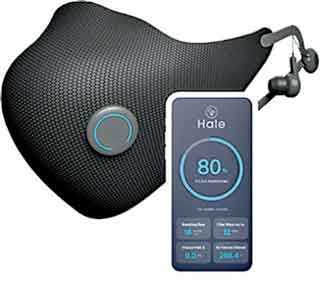Saturday Feb 07, 2026
Saturday Feb 07, 2026
Thursday, 6 August 2020 00:00 - - {{hitsCtrl.values.hits}}
Sri Lanka Institute of Nanotechnology (SLINTEC), a pioneering research institute in the country, is leading the battle against COVID-19 with a number of homegrown innovative solutions.
‘Hale’ is the latest addition to the list of innovations by SLINTEC, a low-cost, ultra-thin and easily-attachable respiratory monitoring smart sensor that has been developed in collaboration with CirQ Labs, another high-tech innovation hub specialising in healthcare solutions.
The developed ‘Hale’ smart sensor can be attached to any face mask and it then captures and records the variations detected in exhaled breath characteristics. By analysing the gathered data with advanced data processing techniques, Hale’ is capable of alerting the wearer via a smart phone app in a situation where the safety of the mask wearer is compromised due to a loosened mask or a saturated filtering layer. ‘Hale’ can also monitor the wearer’s respiratory rate in real time, which is used to direct users for medical attention if it is beyond normal conditions.
‘Hale’ also enables remote monitoring of patients and is extremely useful in treating patients with highly contagious respiratory diseases such as COVID-19 without increasing the risk of medical staff getting infected.
At present, in many hospitals, there is no system available to remotely monitor the respiratory rate and core body temperature of the patients, which are key parameters in COVID-19 patient management. ‘Hale’ smart sensor system remotely monitors respiratory rate, breathing pattern and core body temperature variations of the patients and displays this data on a dash board at the nursing station of the hospital wards with COVID-19 patients. If there are any significant variations, medical staff will be notified.
This allows health staff to make critical decisions in patient care without exposing themselves to the COVID-19 virus, significantly reducing the risk of getting infected.
The sensor is fabricated based on a printable graphene ink, a novel and a unique sensor fabrication technology which leads to a very high sensitivity and a significant reduction in manufacturing cost.
SLINTEC, along with Ceylon Graphene Technologies, has been a pioneer in graphene research during the last few years, not just in Sri Lanka but throughout the world.
Hale’s sensor material (sensing element) interacts with the components in exhaled breath and changes its electrical properties. These changes are then picked up by the electronic circuitry in the communication module, which uses Bluetooth and Wi-Fi technologies to transfer the data to a cloud database and then interpret information to user by state-of-the-art signal processing and machine learning algorithms.
The next step would be developing the sensor into a breathalyser that can detect specific biomarkers (ex. ethanol, acetone) in breath, which would open doors into diagnostics/biosensor market in North America, Europe and Asia Pacific Markets.
FT Link
https://m.facebook.com/story.php?story_fbid=3981345068603586&id=1111514975586624
http://www.cirqtechnologies.com/hale.html.